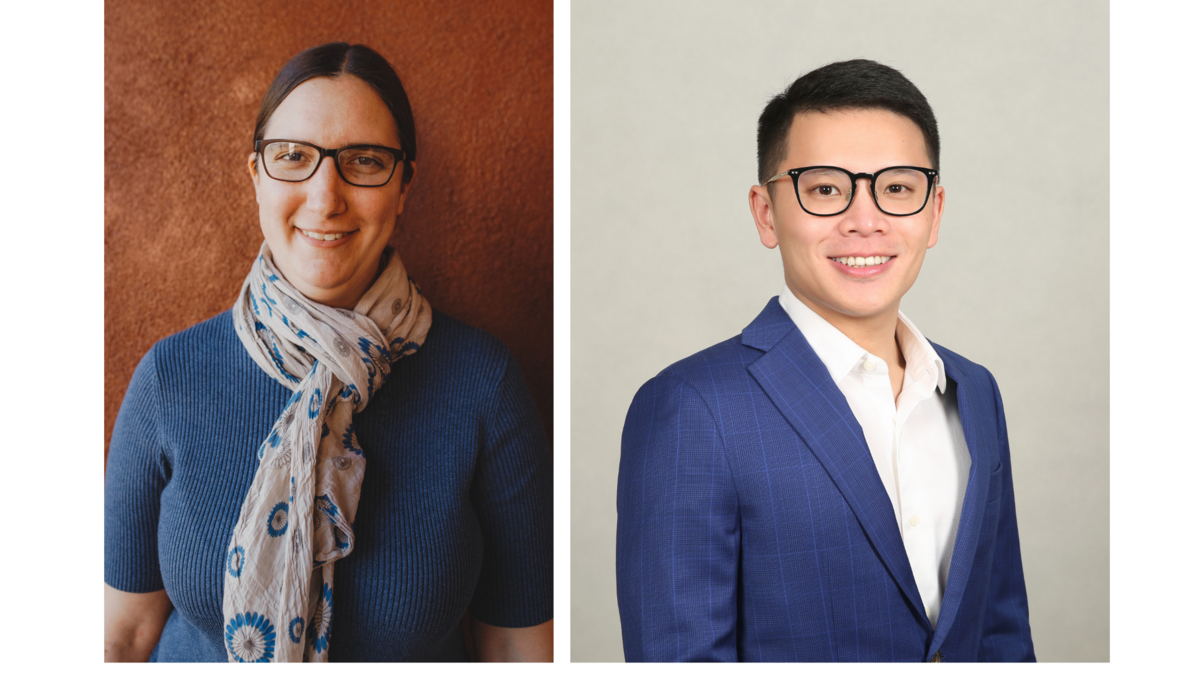2 ASU faculty awarded prestigious fellowships for research in history, religious studies

Hannah Barker (left), associate professor of history, and Han Hsien Liew (right), assistant professor of religious studies, will be fellows at the Institute for Advanced Study beginning in fall 2024. Courtesy photos
Two faculty from the School of Historical, Philosophical and Religious Studies at Arizona State University have been awarded distinguished fellowships at the Institute for Advanced Study beginning in fall 2024: Hannah Barker, associate professor of history, and Han Hsien Liew, assistant professor of religious studies.
Each year, the Institute for Advanced Study, or IAS, welcomes more than 250 of the most promising postdoctoral researchers and distinguished scholars from around the world to advance fundamental discovery as part of an interdisciplinary and collaborative environment.
Visiting scholars are selected through a highly competitive process and selected by permanent IAS faculty. Research at the IAS is conducted across four schools — historical studies, mathematics, natural sciences and social science. This prestigious membership allows for focused research and the open exchange of ideas among an international community of scholars.
Both scholars will use the dedicated time to write and research material for major works-in-progress: Barker will begin work on her second book and Liew will finish his first.
Barker’s project, titled “Freed or Free: Slavery and Changes of Legal Status in Medieval Genoa,” will examine how enslaved people in the region used petitions to challenge and sometimes overturn their enslaved status. She will be the first English language scholar to write a book on this subject, as very little scholarship exists in this field, even in other languages.
“This is a dream,” Barker said. “The time and the resources that (the IAS) provide(s) will be invaluable for making progress on my book. It’s a great honor to receive this fellowship and I’m very excited for my year there.”
Liew’s book-in-progress is titled “Preaching Pious Rulership: Piety and Emotions in Ibn al-Jawzi’s Political Thought” and focuses on the rhetoric used by preachers in the medieval Islamic world, especially the intentional use of emotional language in their sermons, and examines how this impacted Islamic political thought at the time while also drawing comparisons to Western ideologies. Liew sought out support from the Humanities Institute at ASU, which supports research and creative engagement, while working on his proposal for the IAS.
"As a junior scholar, receiving a fellowship from a prestigious institution like the IAS gave me a huge boost of confidence in my own work,” Liew said. “I am looking forward to my time there to finally finish writing my book. I am also excited to meet and connect with other members in my fellowship cohort and other scholars in the greater New York and New Jersey area.”
Among past and present IAS scholars, there have been 35 Nobel laureates, 44 of the 62 Fields Medalists, and 23 of the 27 Abel Prize laureates, as well as MacArthur and Guggenheim fellows, and winners of the Wolf, Holberg, Kluge and Pulitzer prizes.
“(The school) is proud to be so well-represented at the Institute for Advanced Study,” said Richard Amesbury, director of the School of Historical, Philosophical and Religious Studies and professor of philosophy and religious studies. “Professor Barker and Professor Liew are among the nation's leading historians, and their work promises to expand our understanding of the past in ways relevant to the present.”
More Arts, humanities and education

ASU alumna makes her way back to the ASU Gammage stage for '¡azúcar!'
As the Los Angeles-based CONTRA-TIEMPO dance group prepares for its upcoming production “¡azúcar!” at ASU Gammage, for one member of the dance group it is also a nostalgic return to her home.Born in…

ASU FIDM professor wins international award for fantastical, sustainable creation
The horror of an ailing Earth inspired an Arizona State University fashion professor to create a fantastical garment out of sustainable, re-used and found materials that won a prestigious…

ASU workshop trains educators, professionals from marginalized communities in disaster science
As devastating as hurricanes can be to anyone caught in their paths, they strike marginalized communities even harder.To address this issue, a fund named for a former Arizona State University…